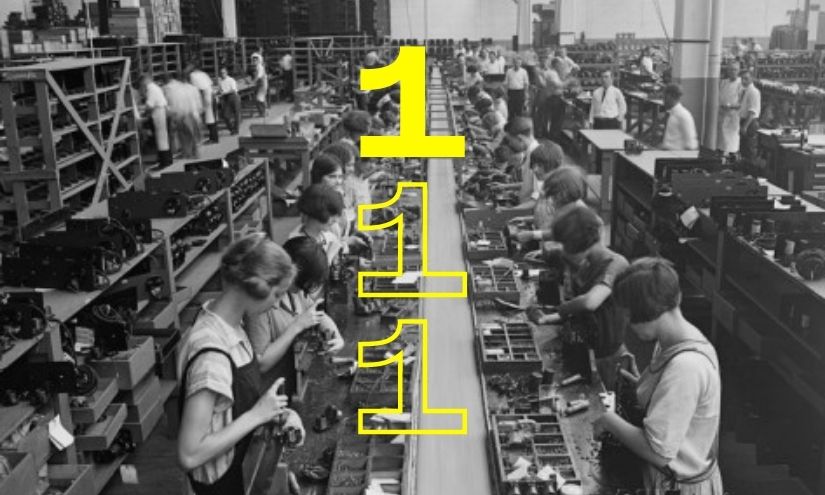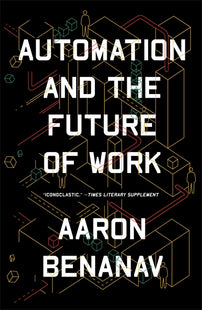There is power in the movement: Organised labour and the conquest of production
Craig Gent analyses the role of unions and potential for social movements in creating a workers' future without scarcity. Part of the Verso Roundtable on Automation and the Future of Work.

Throughout the 2010s, our vision of the future of work has been driven by “the automation discourse” – a tide of discussion in which capitalists and anti-capitalists alike are animated by the possibilities signalled by artificial intelligence, “lights-out” production and driverless lorries. This interpretation of our automated future is coloured by both technological determinism and technocratic inclinations, positions which Aaron Benanav problematises in Automation and the Future of Work. Work is a concept often broken into its constituent parts and in this telling of the story, the “future of work” refers to the future of employment, rather than the future of work’s organisation or labour relations. Instead of focusing on changes to the way work is carried out by workers, or the effect of advanced computational technologies on workers and their struggles, Benanav examines the structural tendencies governing employment as capitalism continues to stagnate. This focus explains Benanav’s targeting of the “automation theorists”, whose assumptions about both automation and proposals for a universal basic income are unpicked throughout the book. In doing so, Benanav reasserts the “conquest of production” as a necessary step in “bringing capital to heel” before we can embark on a post-scarcity future; a massive struggle which will need to be undertaken by powerful social movements.
Referring to automation theorists’ tendency to extrapolate macroeconomic generalisations from the specific effect of introducing particular technologies in particular workplaces, Benanav finds it “unhelpful” that “much of the debate around the future of workplace automation turns... on an evaluation of the degree to which present or near-future technologies are labor-substituting or labor-augmenting in character.” Yet it is difficult to begin a conversation about the need to take control of production without addressing the partial automation – particularly data tracking and algorithmic management – which now defines a growing number of workplaces and productive processes, from manufacturing to food supply chains. Moreover, an account of the relationship between automation and employment which brackets out the content of work (and specifically workers’ experiences of technologies at work) runs the risk of also bracketing out some of the groundwork needed to create a social movement of the type Benanav advocates. For instance, there’s a growing consensus on the left that logistics is a uniquely strategic site of struggle in an increasingly deindustrialised world. On this issue, Benanav agrees, referencing the fact that “in a world of lean, just-in-time production, organizing to blockage circulation in and around major cities can prove an effective tactic.” How, then, to build on these experiences of bad work to create movements that build towards a post-scarcity society and economy?
For some, the answer is to call for that lauded hallmark of post-work imaginaries: universal basic income. Zeroing in on the left-wing cases for a UBI, Benanav argues that although such a technocratic fix might temporarily empower workers, it is unlikely to actually disempower capital. If we really want to achieve a post-scarcity society and economy, Benanav argues, the path must sooner or later run through production, so that society can be organised on the basis of freedom and the equitable distribution of necessary work. But the conquest of production necessarily involves laying claim to the organisation and direction of work – as labour, not only employment – particularly if it aims at achieving a more dignified and less authoritarian character of work in a post-capitalist society.
[book-strip index="1" style="buy"]The recognition that the movement which could finally bring capital to heel (Benanav’s formulation) would need to be one that presents “a truly existential threat to asset owners’ wealth” means a difficult conversation arises regarding the role, failures and capacities of the organised labour movement. While Benanav is excited by the autonomous global social movements of the last decade or so – as am I – it remains the fact that few social movement actors have as great a proximity to production as unions. Unfortunately, as Benanav also argues, trade unions have effectively been defeated over the last forty years, at least insofar as we might have imagined them to be vehicles capable of seizing the control of production from capital.
This defeat has long been a point of lamentation across various sections of the left. In Labor and Monopoly Capital (1974), Harry Braverman recalls how over the twentieth century unions turned away from demanding workers’ control to a preference for merely sharing the gains of capitalist production. He writes: “The unionized working class, intimidated by the scale and complexity of capitalist production, and weakened in its original revolutionary impetus by the gains afforded by the rapid increase of productivity, increasingly lost the will and ambition to wrest control of production from capitalist hands and turned ever more to bargaining over labor’s share in the product.”
Benanav’s insight that slowing economic growth puts unions into disarray is especially perceptive in this sense. However it seems clear to me that if the labour movement (in whichever form we conceive of it) did want to put workers’ control back on the table it would have to break with trade unions’ obsession with ‘fixing’ the employment relationship. This conciliatory approach is certainly the primary focus of most unions’ concerns within technologically-augmented workplaces, with questions over the organisation of work historically left to the state and bosses to regulate.
As Raniero Panzieri, the co-founder of operaismo, recognised sixty years ago, trade unions are typically guilty of holding an ‘objectivist’ view of technology which essentially accepts capitalist rationality with respect to the development of workplace technologies in favour of struggles over wages. This insight dovetails with Benanav’s argument that social movements need to escape the limits of struggles over the collective reproduction of the working class and organise themselves around the conquest of production.
What this would require, however, is the development of a greater understanding of the politics of computational technologies which are now intimately woven into the fabric of production itself. Generally speaking, unions have much catching up to do in this area. Of more immediate interest still is the fact that algorithmic management technologies rearrange the power relations between workers and capital in complex ways, including making it harder for workers to organise in the first place. My own research found that in logistics workplaces, for example, algorithmic management is responsible for enacting temporal, spatial and communicative discipline which precludes the possibility of workers developing meaningful interactions with each other, while obfuscating the managerial authority behind the many algorithmic layers of “the system”. There has to be some point at which we deal with this reality, and we have to start by understanding the nature of these algorithmic systems for ourselves.
At the very least, developing new political forms of worker organisation – in the logistics sectors, for example – requires engaging with those workers. After all, if workers’ power comes from production, it is necessary to understand the practical and existing relationships between workers and production. To neglect this would be to theorise a future of work without theorising the content of work. A movement based on this theory – whether comprising trade unions or autonomous social movements – would wage a struggle which would be largely extrinsic to actual workplaces, and would therefore never really reach the point of production. In many logistical workplaces, this is effectively what trade unions have been doing anyway – a consequence of having been out-flanked by companies’ modes of organising work and workers, which have neutralised many of the tactics typically relied upon by unions to establish and build branches.
In Automation and the Future of Work, Benanav argues that social movements need to begin organising themselves around the conquest of production. Doing so would require the articulation of a vision of a wholly new world. In this department at least, Benanav consistently praises automation theorists for attempting to broaden the horizons of our collective imagination. UBI may not be the answer, but it is a helpful prompt to allow us to imagine a post-scarcity world. The book ends by putting the onus on its readers to seek out the movements necessary for the massive social struggle needed to achieve this new world. Benanav concludes: “Movements without a vision are blind; but visionaries without movements are much more severely incapacitated.” Yet it is an aphorism from a chapter questioning the existence of “silver bullets” which is most instructive: “This is the world we’ve inherited, and it’s where our political reflections must begin.” Yes, this applies to the structures of contemporary capitalism, but waging a struggle for production means understanding the labour movement and workplaces we’ve inherited too. It is here we must start to reflect.
***
Craig Gent is the head of operations at Novara Media. He previously wrote a PhD on the politics of algorithmic management at the University of Warwick. He lives in Leeds.
This article is part of the November Verso Roundtable on Automation and the Future of Work. You can find the rest of the series here.
Automation and the Future of Work by Aaron Benanav is one of our November Book Club reads: a carefully curated selection of books that we think are essential and necessary reading. All our Book Club memberships are 50% off for the first 3 months. Find out more here.
